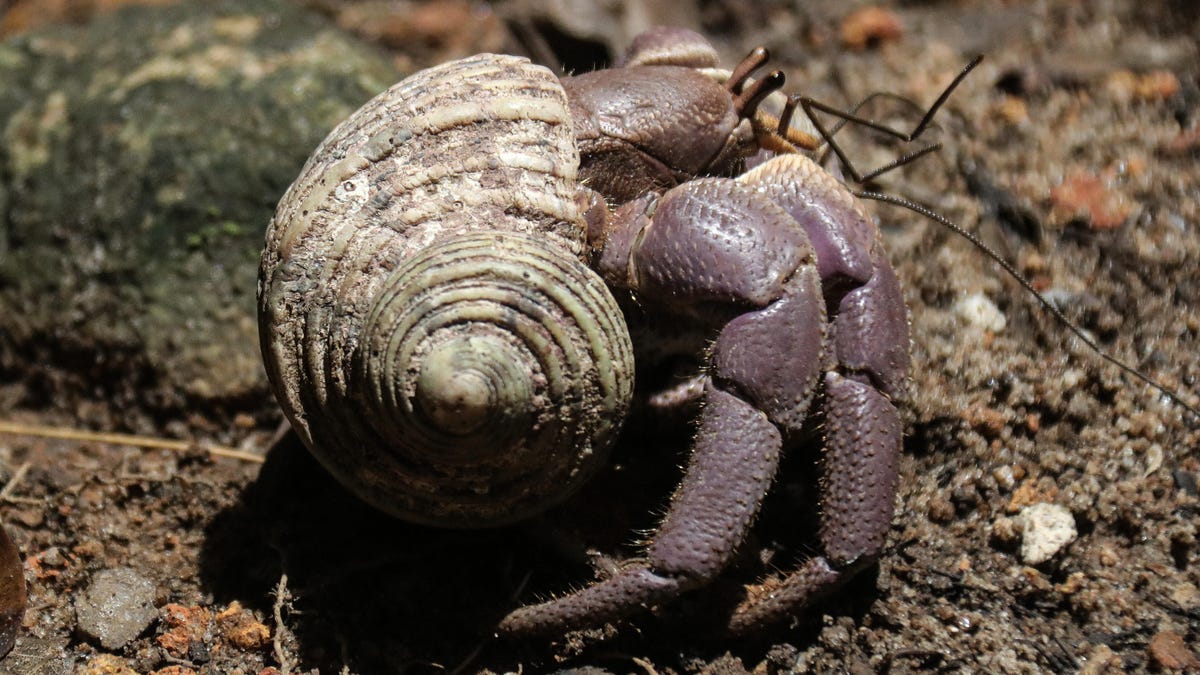Plastic waste in ocean is getting hermit crabs 'excited'
Human pollution has all kinds of unforeseen consequences on marine animals, a new study reminds us.

Ocean plastics are impacting hermit crabs in a surprising way, a new study says.
Ocean pollution has many consequences for marine life, including, it appears, getting hermit crabs "excited."
Low concentrations of a common plastic additive called oleamide speed up the crabs' breathing rate, indicating excitement and attraction to the material, according to a study published Tuesday in the Marine Pollution Bulletin. That might sound like good fun for the crabs, but it's yet another example of ocean plastic disrupting ecosystems and wildlife. Earlier this month, a separate study detailed the significant and heartbreaking harm all that plastic we dump in the ocean inflicts on baby turtles.
Oleamide bears a striking resemblance to oleic acid, a chemical released during decomposition of the invertebrate animals known as arthropods. The additive confuses the hermit crabs, says Paula Schirrmacher, a doctoral candidate at the UK's University of Hull who's been studying the impact of climate change and plastic on the little crustaceans.
"As scavengers, hermit crabs may misidentify oleamide as a food source," Schirrmacher said in a statement. "This research demonstrates that additive leaching may play a significant role in the attraction of marine life to plastic." Oleamide, notably, has the opposite effect on humans -- some take the organic compound as a sleep aid.
It's easy to joke about happy hermits crab here, but the University of Hull study underscores a sobering reality. At least 8 million tons of plastic end up in our oceans every year, according to the International Union for Conservation of Nature, and plastics make up 80% of marine debris from surface waters to deep-sea sediments.
To explore the reaction of marine wildlife to odors emitted by plastic, the team collected 40 crabs off the coast of Yorkshire, England, and transported them to university aquariums. There, they measured the creatures' respiration after injecting oleamide into their seawater habitats. "Our study shows that oleamide attracts hermit crabs," said Schirrmacher, whose research focuses on how climate change can alter the chemical cues aquatic creatures rely on to navigate their environment.
"The potential for the vast variety of plastic additives to mimic natural infochemicals for a wide array of species creates a multi-faceted problem that urgently needs further investigations to initiate mitigation measures," the study says.
Research from last year by a different team found that plastics impair hermit crabs' cognition, impacting their ability to select and enter the best shell to protect their fragile exoskeletons.
In more optimistic ocean plastic news, Samsung announced on Wednesday that it's considering making phones from reclaimed ocean plastic as part of its sustainability push. The electronics giant is the most recent Big Tech company to embrace a stronger pro-planet pledge.
Correction, Aug. 13: An earlier version of this story suggested, based on press materials provided by the University of Hull, that oleamide sexually excites crabs. The university has amended its materials to omit any connection to sexual response.

